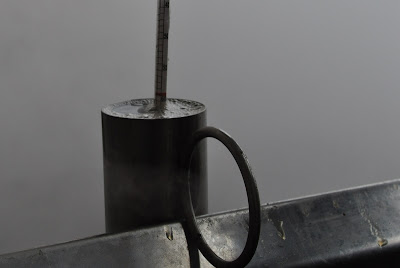Before driving (I got to be the designated driver since Andy doesn't drive) down the road to the maple trees we stopped off and Andy showed me the work Lizzie has been doing with the seedlings for the gardens. Come back next Sunday to see the pictures and see what is already growing for the CSA this season.
What I saw as we drove down the road were trees with white/clear bags hanging on their sides. I envisioned galvanized buckets with vented lids and little silver spigots that would have sap dripping out of them. Boy, did I have a lot to learn...about a lot of things today. Andy removed one of the bag and I got to taste raw sap. I thought it would be sweet. Nope, just tasted like water with a little bit of a funny taste.
When each bag is filled Andy brings a wagon filled with empty five gallon buckets. The bags are dumped into the buckets and then the buckets are taken to a holding tank at Lizzie's sister and brother-in-laws house on down the road.
This clump of trees seem to be the best producers of maple sap. This is the second year for sap gathering and Andy is hoping for a large amount. Sap gathering depends on the weather. Seems that cold nights and then warmer days make the sap run. A good temperature would be around the 20's at night and then a warm up to the 50's in the day.
Andy has placed 650 bags on the trees. If you stand and look around the woods, it seems that they go on forever...as far as you can see. The neighbor across the road even has some on his trees this year. On a really good run the bags can be filled in a day and a half. That's a lot of 5 gallon buckets to fill.
I learned that it takes 50 gallons of sap to make 1 gallon of maple syrup. Once there is a wagon full of 5 gallon buckets they are taken to the 'holding tank'. From the 'holding tank' the blue hose takes the sap to the Sugar House. Andy has two holding tanks...one holds 1500 gallons and the other holds 2100 gallons.
This is the place to be if you want to smell something sweet and stay warm. The Sugar House is designed with a high ceiling so that when the water is being cooked off, the steam has room to rise.
The sweet smell of sap cooking over a wood fire is almost as good as apple butter cooking in a cooper kettle. I am still not quite sure how the sap keeps moving along the little canals in the 'cooker' but it somehow makes it way from being clear in the beginning of the process to a rich caramel sweetness in the end. Many hours of cooking. Everyone takes a shift because the fire needs to be fed during the entire process...day and night The length of the cooking process varies according to how much water is in the sap. There might be some straining that needs to be done during the process also.
I found my favorite spot...right here at the opening of the fire. The stack of wood that was being used to fuel the furnace was taller than me (I'm 5'9") and about 25 feet in length.
On the opposite side of the tank from where the sap enters it is 'measured' and I can only imagine a few tastings have occurred at this site also. The sap is poured into this cup so that it can be checked.
It might be a little hard to see but there is a thick red line on this thermometer. Once the thermometer can stand along and floats at this line it is ready for the last step in the processing.
Large stock pots of maple syrup are cooked until the syrup reaches 180 degrees. After which it is poured into plastic jugs and sealed ready to fill the orders for the CSA. If you would like to know more about the prices of maple syrup or any other items offered from the CSA just click here.
As you can see I got to bring home lots of different pieces of Cedarmore Farm today. I think we might be having a big country breakfast tomorrow morning.












